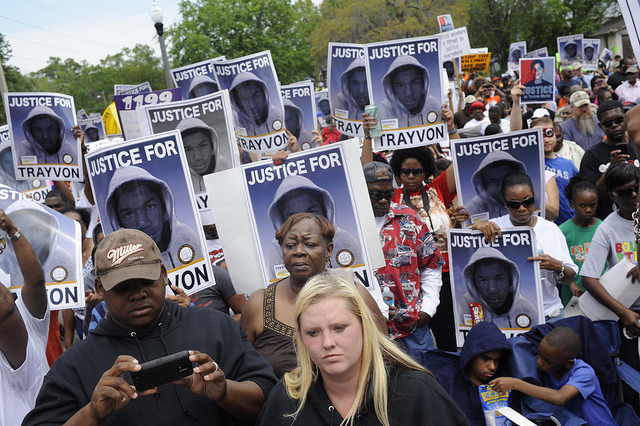Zimmerman case reaffirms what most people believe

By Ray Salazar, NewsTaco
Another tragedy of the Trayvon Martin and George Zimmerman case is that yesterday’s decision, which found Zimmerman not guilty of second-degree murder, reaffirms what most people believe: most white people will inherently do good while most black and brown people are inherently up to no good.
Even though Zimmerman’s mother is Peruvian, George Zimmerman’s last name contributed to a simplification of the race issue in this case, proving that labels matter more than truth.
I’ve called 9-1-1 a number of times in my old and new neighborhoods, but not because there was a kid of color walking down the street. I called because some guys were smoking weed on my neighbor’s front steps. I called because a group of guys stood at the corner flashing gang signs at passing cars. I never called because a black or brown kid walked down the street.
I joke with my students when I see them leave the school in a group: “If there’s more than three Latinos walking down the street or riding in a car–someone gets in trouble.”
Trayvon Martin, however, walked alone in an unfamiliar neighborhood, because he was visiting his father, and reinforced what most people believe: black and brown teens are usually up to no good.
To George Zimmerman, the hoody, the dark skin, the youthful stance meant trouble. If Trayvon Martin had been white, Zimmerman would have likely never called 9-1-1. He would have likely never felt threatened. Imagine that 9-1-1 call coming from the gentrified streets of Logan Square, Wicker Park, or Pilsen:
“A white teen with dark-rimmed glasses, a sloppy hooded sweatshirt, a faded t-shirt, wrinkled jeans, and dirty sneakers is walking suspiciously down my street.” Most people wouldn’t believe this presents a threat.
Even though Zimmerman was told by the 9-1-1 operator not to approach the person he described and not to get out of his car, Zimmerman still approached Trayvon Martin. And in court with the silhouette cut outs of both males, most people believed Trayvon Martin was the big black man most people fear.
Even if Trayvon had survived, his version may not have mattered. Before his death, Martin was suspended for having drug residue in his book bag. Most people believe, after all, that the narratives of black and brown youth carry little weight.
When Rachel Jeantel, who was on the phone with Martin when Zimmerman approached him, took the stand, her Tweets about getting a manicure with “court room nails” and “drinking and smoking” undermined her testimony. She–too–proved that Zimmerman approached Martin. But most people will not believe a young black female who lied about her age to protect her privacy. Most black and brown youth believe the court system will not protect them.
So many people now believe that Illinois’ conceal and carry legislation will make our streets safer. Zimmerman had a gun. He used it to kill a young person. If Martin had had a gun, Zimmerman’s self-defense argument would have been even stronger.
Our state’s conceal and carry legislation will let people continue to believe that they have equal power to the police, who have used their power questionably sometimes. It leads people to believe that snap decisions that result in harm are acceptable. It lets people believe that we should live in fear.
The jury in the Zimmerman case consisted of six females. Their decision will unfairly reaffirm what many people stereotypically believe about women’s decision-making abilities.
I believe George Zimmerman is guilty. I believe he provoked Trayvon Martin. I believe Trayvon Martin never should have gone out for a walk–even to 7-Eleven–by himself in an American city he was visiting.
This article was first published in The White Rhino.
[Photo by Kevin J. Dotson]
